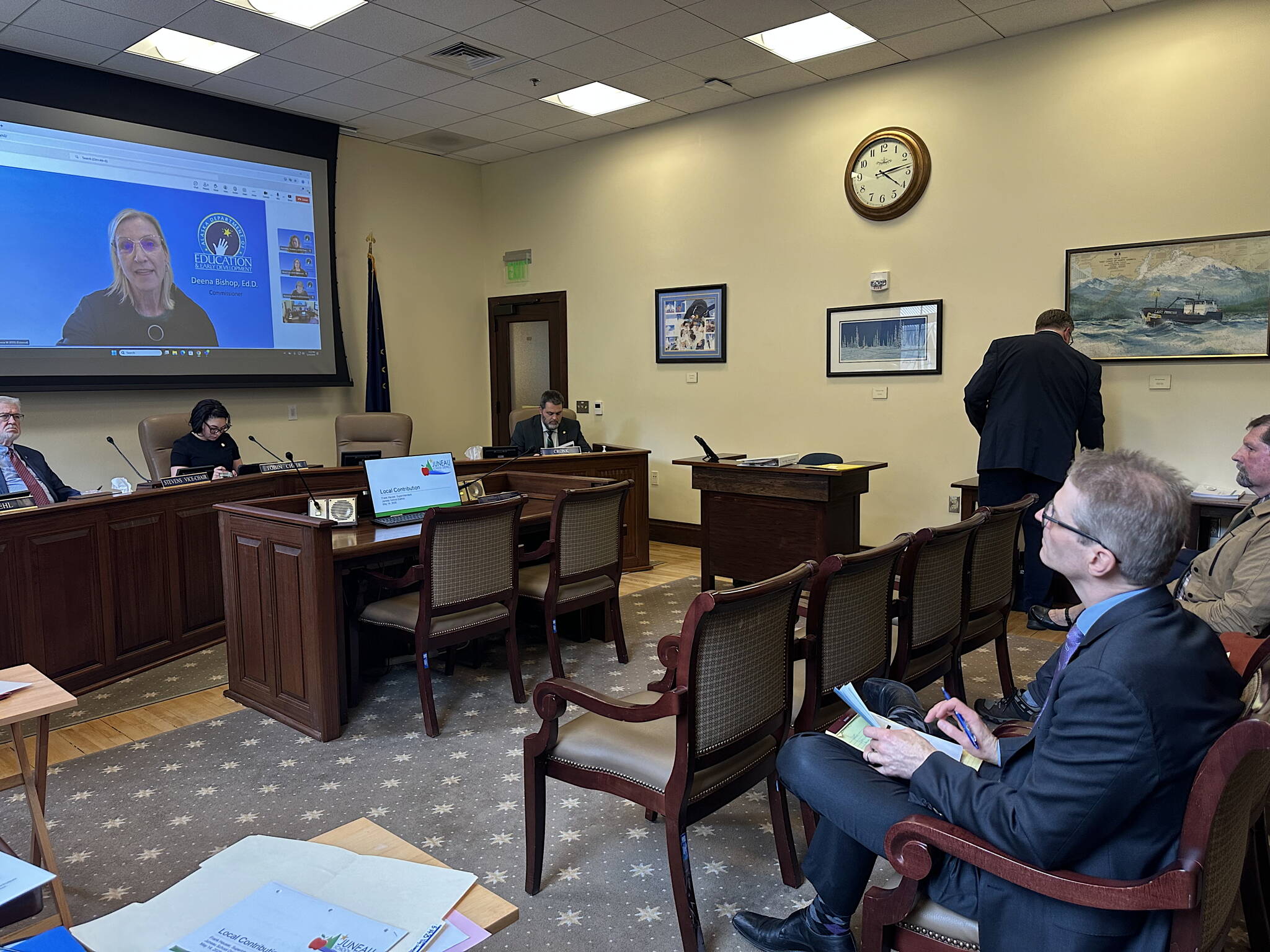Alaska’s state school board unanimously backed down Wednesday from an emergency regulation limiting funds local governments can provide school districts after state lawmakers and other officials challenged its legality.
The change would have immediately stripped millions of local dollars from school districts statewide on the grounds that $81 million in federal impact aid is at risk this year.
Instead, the board approved a 30-day public comment period. The Alaska Department of Education and Early Development (DEED) has been considering the regulation change restricting what municipalities can contribute to their neighborhood school districts for nearly a year— but until this week said it would take effect in 2026.
The Juneau Board of Education has been questioning if they could trust the promise of a delay. Wednesday’s meeting considered rushing the department’s proposal, confirming their fears.
Most people testifying over a two-hour period asked for a full public process to occur, saying they learned of the meeting the same morning. The Juneau school board was notified about the emergency regulation Monday, leaving no time to issue a formal statement. Testimonies questioned the legality of the state education board taking up the proposal and said it attacked schools already facing budget deficits.
“Could you feel good about a regulation change that was done without parents even knowing, without districts or communities having any opportunities beyond three minutes today for feedback, and that is based on rationale that simply isn’t true?” Juneau School District Superintendent Frank Hauser asked the state board.
“News flash: the state failed, and already failed the disparity test two years ago, and local contributions weren’t included and weren’t the issue,” he said.
Hauser was asked to “wrap up his comments” after two minutes.
A JSD memo states it is receiving about $2.1 million through local contribution for the coming school year, with funds going toward food service, student transportation, community schools, the Learn-To-Swim program, high school and middle school student activities, and Pre-K programming.
“That is a significant increase to our mill rate,” Deputy Mayor Greg Smith said in testimony against the proposed change. “That would be a significant change to our sales tax and we would face intense political pressure to come up with that money. We do not take it lightly that we put this money forward for our students, but our community demands it and we are supported in doing so.”
Nicole Herbert, chief financial officer for JSD, said the state currently excludes pupil transportation costs from the impact aid disparity test, which is cited as the primary reason for the emergency resolution. She said her biggest concern is the change, as written, would expand the restrictions beyond municipal contributions to include other revenue such as payments for school lunches and student fundraisers, creating significant uncertainties.
“This is not going to promote fairness as DEED suggests, it’s going to widen the gap between well-resourced and under resourced communities,” Herbert said. “Finally, making this effective immediately would automatically put every single district out of compliance.”
She said this is not because districts are unwilling, but because of the short notice, they would not know how to adjust.
Time is ticking for schools across Alaska facing budget deadlines, with three weeks remaining for this fiscal year.
Sen. Jesse Kiehl (D-Juneau) said requiring a municipality to reduce funding for fiscal year 2026 after the June 1 statutory deadline would break state law. He said the proposal would move about $30 million out of school districts.
“If that sounds like the 13th stroke of the clock, it’s because you can’t move that much money,” he said.
Kiehl insisted the board deny the department’s request to propose the regulation because it failed to meet the legal test for an emergency. He also said he thinks the state could win an appeal against the federal findings of the failed disparity test, and suggested the board wait for further review.
His thoughts were echoed by Sen. Bill Wielechowski (D-Anchorage), who has been an attorney for 32 years. He also serves as the Senate Rules Committee chair and has been chief negotiator for the Senate on education issues for the last two years.
“This is a clear violation of the Alaska Open Meetings Act, as the public has been not provided with reasonable opportunity to participate in this,” Wielechowski said. “A careful review of the emergency regulation statute shows that such regulation must be directly related to the immediate preservation of public peace, health, safety or general welfare. This regulation does none of that. In fact, it does just the opposite. This will have a catastrophic impact on my constituents and people all across the state, students and parents alike. What this is is a pretext, it is, to be blunt, a ruse to undermine public education in the state of Alaska.”
He said the regulation change would have no impact on fiscal year 2023 data used for the recent disparity test, which determines whether the state can use impact aid payments as state aid.
State board members held an executive session after hearing public testimony, then voted to postpone a decision on implementing the change.
“I never want this board to be compromised by its integrity, compromised by rash decisions, so I just want to apologize to the state if it’s taken energy away from anything else,” James Fields, chair of the state school board said. “And that was never our intent. Our intent is to just try to uphold the law and do what’s best for kids. Giving time for public comment is what’s best for kids.”
Information on submitting comments can be found at DEED’s regulation page.
• Contact Jasz Garrett at jasz.garrett@juneauempire.com or (907) 723-9356.

